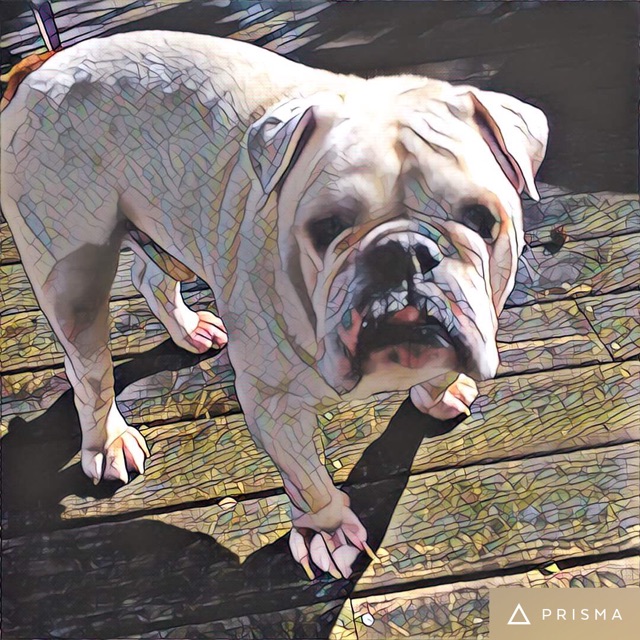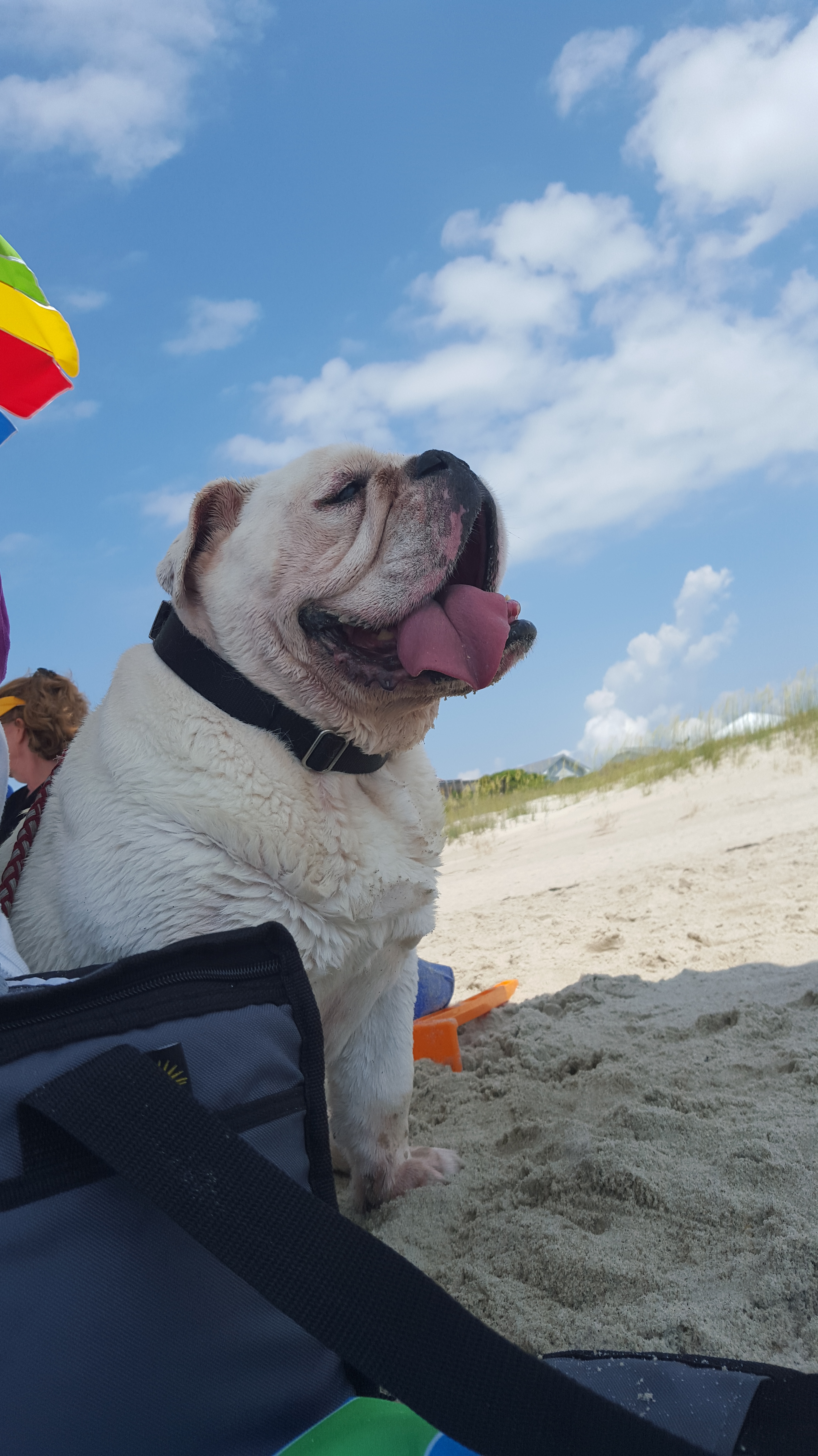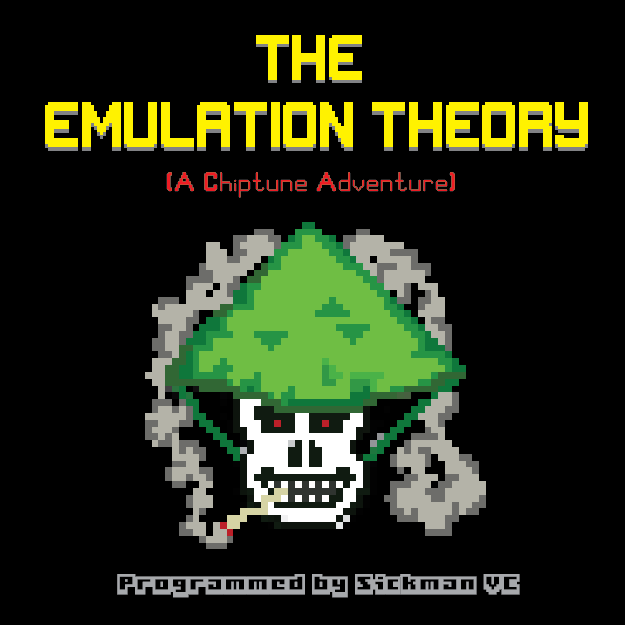
Today, August 28th, 2019, would have marked Boodha the Bulldog’s 13th birthday. When we lost him back in May, I wrote on this very platform, about what he meant to me, my wife, and our family. After the grieving subsided somewhat, I decided to dive a little deeper and was really thinking about not just the cherished memories with our beloved family pet, but the life lessons I learned from Boodha’s time on this earth. Since he touched and taught me so much, on so many different levels, I decided to write down many of these lessons. I am far from a novelist, but I have aspirations of eventually refining the writings and putting them into novel form, maybe even two versions. The first version would be an adult, almost “self improvement” book and the second version a condensed, kids book, complete with illustrations by yours truly.
So on this “would be” birthday, I included an excerpt from my work. It is one of many of the life lessons I pondered that Boodha the Bulldog taught me about life. In the coming months, I look forward to posting more of these that I have in the pipeline and ones that I will continue to create and refine.
… Happy Birthday my friend, I truly miss you!
Patience:
By far one of the most valuable lessons I learned from my time with my beloved Boodha, was patience. The very task of being the caretaker of another being, which begin with Boodha as a helpless young puppy, totally reliant on his caretaker to survive and ultimately thrive, taught me early and often, that I must take a step back and wait for certain things to unfold if I wanted to yield positive results or progress. Necessary tasks when rearing a puppy, such as house breaking him, integrating him into a new home, and setting his daily routine, all proved to be challenging exercises in patience. Whether one buys into the idea of animals having unique personalities or if it could be attributed to his notoriously, stubborn English Bulldog breed, Boodha, from the time as a puppy, all the way up to his final days, always projected a stubborn, disposition about nearly everything. With what seemed like a very high level of animal intelligence and an ability to pick up on things quickly, I always got the sense that he would understand any corrections, instructions, or concepts taking place but then would make a decision on whether to comply or refuse, in that moment. Boodha was not a low intelligence animal, complicit in all of his owner’s commands, as some sort of blind desperation for affection, nor was he an animal suffering from deep trauma and complicit out of fear, and terror of repricussions. Any attempts on my part to expedite or force the compliance process with him were futile and it became a game of waiting and consistency, both of which it behooves one to be patient.
Even with an emphasis on discipline and establishing a physical routine, like when walking him, or bathing him, required me to learn how to hang in there, not push too hard, and wait for things to unfold, almost organically. When I tried the opposite approach and tried to force the issue, the results were always counterproductive or disastrous. Even as Boodha became older and his eyesight and mobility were severely compromised, in order to still be able to play his favorite game of fetch with him, or take him up and down the stairs after using the bathroom or taking him out, places, I had to learn how to slow down, calm down, minimize any anxiousness, and let him know what I wished of him but not in a negative, forceful way, based on my own impatience and my own urgency. When I was able to pull off this more patient approach, he was always more responsive and it really allowed me to maintain high energy levels and active participation from him, all the way up to the very day he passed.
The lesson of patience I learned from Boodha was invaluable and I was able to and am still applying it everyday to rearing my two children. Although my children have gained verbal communication and reasoning skills, which change the equation some what, the ability to take a step back and just let things unfold naturally versus aggressively pushing the situation have proven to work well just like with Boodha. Especially as they grow older, I can see the value of taking a step back, after whatever I asked or requested from them, and letting them process it, and giving them time and the freedom to produce. When I do lose patience, and I have an anxious, aggressive attitude looking for immediate results from them, like Boodha, they become less responsive, and in many cases they even react the opposite of what I think I want from them, as a reminder that pushing is problematic and patience is a virtue.
Don’t get me wrong, the idea of practicing patience that Boodha taught me, does not in any way, diminish a sense of urgency, nor the aggressive pursuit of something, both of which there is a time and place for. However, Boodha was a very tangible, literal example of the idea of practicing patience. For example, having on many occassions, to literally pull and drag him on his leashe just to get him started walking, knowing it was necessary to keep him healthy and knowing he would, most of the time, eventually enjoy it after getting started, patience had to be prevelant with him on these walking expeditions. If I had little patience in this scenario and I tried to drag him, he would dig his heels in like a stubborn bulldog and would fight me tooth and nail, to not walk. As he blossomed into a muscle bound, 70 lb adult dog, the idea of tug a war with him, was just a way to exhaust me and make me give up walking him, altogether. If I lacked patience in this same walking scenario and I refused to walk him and went right back inside, and gave up, I could expect a dog later that day, bursting with excess energy, not wanting to eat all his food, or having a bathroom accident in the house, all possible scenarios from a dog that did not get proper excercise and stimulation. Instead, stern and consistent verbal commands from me, and a slow game of nudging by the inch and then foot, while continually waiting on him to progress, eventually led to momentum, and then led to a full walk, and in turn, led to a happier, balanced dog.
This literal example of walking Boodha is a metaphor for practicing patience in real life. Regardless of the scenario, whether child rearing, a romantic relationship, or a career, etc., often when we lack patience, and seek immediate results, and we tug on a metaphorical leashe and try to pull instead of taking time out to let the situation unfold and let the other person or thing respond, we are met with resistance from the other and a refusal to comply. Then there is little or no progress foward or a complete digression takes place. This is because we are not considering the other’s time, abilities, or desires and are trying to impose our own upon them in this moment. Instead we must express our own sense of time, abilities, and desires to them but at the same time encourage the existence of their own. It is at this point progress begins to take place and even if initially, it is not at the pace of our expectations, eventually since expectation is dissolved and both parties are equal participants in a sense, the ultimate progress and results take place, naturally as a result of practicing patience.



















